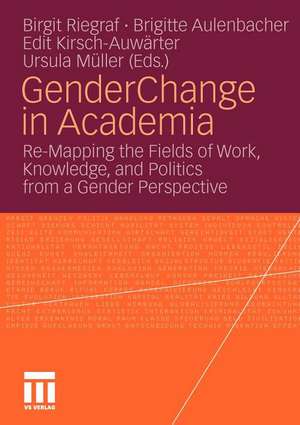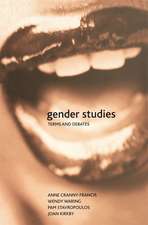Gender Change in Academia: Re-Mapping the Fields of Work, Knowledge, and Politics from a Gender Perspective
Editat de Birgit Riegraf, Brigitte Aulenbacher, Edit Kirsch-Auwärter, Ursula Mülleren Limba Engleză Paperback – 28 iul 2010
Preț: 393.52 lei
Nou
Puncte Express: 590
Preț estimativ în valută:
75.30€ • 78.83$ • 62.31£
75.30€ • 78.83$ • 62.31£
Carte tipărită la comandă
Livrare economică 05-19 aprilie
Preluare comenzi: 021 569.72.76
Specificații
ISBN-13: 9783531168326
ISBN-10: 3531168320
Pagini: 458
Ilustrații: 458 p. 12 illus.
Dimensiuni: 148 x 210 x 35 mm
Greutate: 0.54 kg
Ediția:2010
Editura: VS Verlag für Sozialwissenschaften
Colecția VS Verlag für Sozialwissenschaften
Locul publicării:Wiesbaden, Germany
ISBN-10: 3531168320
Pagini: 458
Ilustrații: 458 p. 12 illus.
Dimensiuni: 148 x 210 x 35 mm
Greutate: 0.54 kg
Ediția:2010
Editura: VS Verlag für Sozialwissenschaften
Colecția VS Verlag für Sozialwissenschaften
Locul publicării:Wiesbaden, Germany
Public țintă
Professional/practitionerCuprins
“Gender Change in Academia“: Gender in Universities in Lower Saxony.- Engendering the University through Policy and Practice: Barriers to Promotion to Full Professor for Women in the Science, Engineering, and Math Disciplines.- Hyper-Modernisation and Archaism: Women in Higher Education Internationally.- Gender and gatekeeping of excellence in research funding: European perspectives.- The new entrepreneurship in science and changing gender arrangements – Approaches and perspectives.- Gender, Managerialism and Academe: Challenges and Prospects.- Science Between Organization and Profession: Opportunities for Neutralizing Gender? – Reflections on Research Assessment.- Careers and the Reorganisation of University and Research Systems in France and Germany.- Reforming university, re-gendering careers. Informal barriers to women academics in Austria.- Grasping the poisoned chalice: Higher education and managerial identities in Sweden.- Is Science as way of life in transition? Some notes about the every day style of life of academics in Germany.- Academic Life and Gender Relations. The Case of Fathers in Professorship.- Gender Knowledge under Construction. The Case of the European Union’s Science and Research Policy.- Women in cutting-edge research – gender equality and the German Excellence Initiative.- Contemporary Challenges for gender research in the context of globalisation.- ‘Security’ Architectures, New Ontologies and the Category of Gender. Contemporary Challenges in Feminist Technoscience Studies.- Innovative changes in biomedicine: integration of sex and gender aspects in research and clinical practice.- Gender Studies as a Profession.- Promoting Women in Post-Graduate Studies: Chances and Challenges of PhD Reforms in Germany.- From Feminist SocialWork Projects to Gender and Diversity Modules? Gender in Social Work BA and MA Curricula at Universities of Applied Sciences.- Gender Studies in Entrepreneurial Universities: The Case of Inter- and Transdisciplinarity.- Building Two-Way Streets to Implement -Policies that Work for Gender and Science.- Gender Discourses and Organisational Change. The Economisation of Gender Politics in Germany.- What works and what doesn’t: How to increase the representation of women in academia and business.- Gender Politics: Behavior therapy for the two sexes or a structural critique of economic relations?.- Reflecting on practical experience and a case study within the field of gender equality politics.- Gender Mainstreaming, Diversity Management and Inclusive Excellence: From Similarities and Differences to New Possibilities.- Diversity Politics and Diversity Management in Organizations.- Managing Gender & Diversity – Assumptions, Connections and Challenges for theory development.- Promoting e/quality and excellence in universities and research: The “Gender-Alliance” for the German science system.- Do Little Strokes Fell Big Oaks? Mentoring within the Federal Programme for Gender Equality at Swiss Universities and Its Impact on Academic Structures.- Gender Equity in Science.
Notă biografică
Prof. Dr. Birgit Riegraf teaches and is doing research in sociology at the Department of Cultural Sciences at the University of Paderborn .
Prof. Dr. Brigitte Aulenbacher is Head of the Department of Theoretical Sociology and Social Analysis at the Faculty of Sociology at the University of Linz.
Dr. Edit Kirsch-Auwärter is Equal Opportunity Commissioner at the University of Göttingen and Head of the Equal Opportunities Office there.
Prof. Dr. Ursula Müller represents the Gender Studies at the Faculty of Sociology of the Bielefeld University and she is Director of the Interdisciplinary Center for Women's and Gender Studies (Interdisziplinäres Zentrum für Frauen- und Geschlechterforschung, IFF).
Prof. Dr. Brigitte Aulenbacher is Head of the Department of Theoretical Sociology and Social Analysis at the Faculty of Sociology at the University of Linz.
Dr. Edit Kirsch-Auwärter is Equal Opportunity Commissioner at the University of Göttingen and Head of the Equal Opportunities Office there.
Prof. Dr. Ursula Müller represents the Gender Studies at the Faculty of Sociology of the Bielefeld University and she is Director of the Interdisciplinary Center for Women's and Gender Studies (Interdisziplinäres Zentrum für Frauen- und Geschlechterforschung, IFF).
Textul de pe ultima copertă
Implementing the goals of the Bologna declaration means a completely new organization of study programmes, working conditions and the production of knowledge aiming at the harmonization of the European Scientific Area. The new entrepreneurial university is making efforts to increase economic efficiency, transparency and to offer new forms of services in academic teaching and research. More or less vehement debates deal with the question if and to which extent this process will change the original character of academic education and science. Gender research however, is especially interested in the influence of the restructuring process on gender relations. In which way do rationalization and reorganization of the universities and of the universities of applied sciences de/engender academic teaching and research? Where is gender research positioned now? Researchers from European and non European countries will respond to these problems/questions which seem to be unsolved so far.
Caracteristici
Re-Mapping the Fields of Work, Knowledge, and Politics from a gender Perspective














